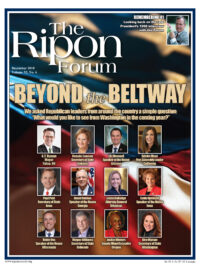
After every national election, in the wake of partisan rancor reaching a fever pitch, most Americans revert to the same old hope: hope that those elected can put the fight behind them and work together in our best interest.
The greatest contribution President Trump and Congress could make in 2019 is to follow the lead of cities across America and balance their budget. Neither political party can claim innocence in digging the hole, but both could leave a better future for coming generations by relieving the debt with which those Americans are being saddled.
City government is in a vanguard at the moment. There has never been a time when more resources have been focused on developing best practices for these laboratories of democracy. There has arguably never been more expectation for the quality of life cities are to deliver.
Yet in the midst of all this, whether liberal cities on the coasts or conservative cities in the plains, the common bond shared by nearly all cities is the mandate to work within a balanced budget. This has forced difficult decisions around pensions, staffing, service delivery, and infrastructure maintenance. But those decisions occur, and future debt is avoided, because a balanced budget is required.
The federal government all too often avoids those open discussions around priorities and thereby pawns the challenges of leadership off on generations not yet born.
It is important to remember this is a relatively new phenomenon. Less than 100 years ago, President Calvin Coolidge grappled in his annual budget with how to maximize the surplus in order to pay down war debt. Presidents known for the expansion of entitlements, like Franklin Roosevelt and Lyndon Johnson, challenged their subordinates to minimize deficit spending and made politically difficult decisions in line with those challenges.
The greatest contribution President Trump and Congress could make in 2019 is to follow the lead of cities across America and balance their budget.
Yet today, the American people are alerted to the dangers of the deficit mostly when a stand-off occurs around the debt ceiling. After that crisis inevitably passes, so too does any national discussion about how to climb out of our shared fiscal hole.
A focus on balancing the budget would also provide federal leaders with the same opportunity that local leaders in cities across America enjoy every day: the chance to work together in solving a practical problem, together as Americans rather than as Republicans or Democrats.
There is an accepted conventional wisdom in America today that local leaders can work across party lines because their issues are logistical, while those faced by federal leaders are more difficult to address due to partisan philosophical differences. This lets federal leaders off the hook and does a disservice to the hard work of local communities.
While the old axiom that “there’s no such thing as a Democrat or Republican pothole” is true, the reality is that funding for fixing potholes within a balanced budget comes at the expense of public safety staffing, public employee pensions, abandoned home remediation – or any number of other worthy causes. Any budgetary discussion is necessarily a prioritization of values, whether they are local, national, or international.
The difference arises because local leaders have the luxury of dealing with problems that are generally more concrete (a street paving project being more tangible to voters than a budget deficit), and therefore constituents have a more immediate indicator of success or failure. So they recognize the obvious – that neither Republicans nor Democrats have the market cornered on good ideas – and bring people together to solve their tangible problems.
The budget deficit is not a tangible problem today, but it will be soon if it is not brought in line. Like lead pipes left to fester in a local water utility, the problem is out of sight until one day when it becomes a catastrophe.
For my generation, the only time we’ve seen Republicans and Democrats in DC set aside partisanship for the greater good has been in fleeting moments of tragedy or war.
So this generation of federal leaders can either spend the next two years fighting over who gets to be in charge when that catastrophe presents itself, or they can more nobly serve the American people by preventing it.
Addressing the budget deficit will not be easy. If it were, someone would have already done it. But it is a specific problem with smart people on both sides of the aisle who can offer ideas for an overall solution.
For my generation, the only time we’ve seen Republicans and Democrats in DC set aside partisanship for the greater good has been in fleeting moments of tragedy or war. Yet the national debt presents as great a challenge to our shared security and future opportunity as any armed opponent. The first step in addressing that debt, in putting future generations in a safer position, is to balance the federal budget.
For the good of our country’s security and prosperity – both today and tomorrow – President Trump and the 116th Congress should lead that challenging national discussion around priorities and use the bipartisan genius of Americans to balance the federal budget.
G.T. Bynum is the Mayor of Tulsa, Oklahoma.




